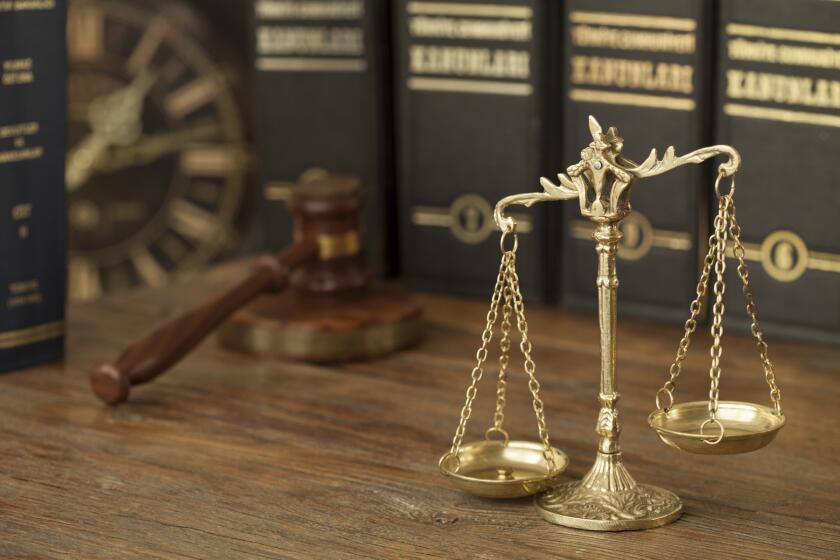Would Buddha read this book?
- Share via
MICHELE MARR
One recent morning right about dusk I had a terrible dream. In the
throes of R.E.M. sleep, I discovered my husband had left me for an
astonishingly successful woman who owned a fleet of boats and
airplanes. (My husband, you see, loves to sail and fly.)
I hadn’t seen it coming. Not at all. And now my heart was
breaking. I was desperate to know (other than the planes and boats),
“Why?”
My husband shunned my question. As a disgruntled spouse often
will, he seemed to think I ought to know. So I turned to one of his
close friends, Don, for answers. I wailed at him, “Nothing told me
this was coming. Did you know?”
The way he pursed his lips and closed his eyes told me. “Why
didn’t you tell me?” I implored, “Why did he do this?”
Don shook his head. “I don’t know. You’re just going to have to
accept this is the way it is.” The floor under me turned into a long
elevator shaft and I began to fall. Then I had a thought: What is the
sound of one hand clapping?
It’s an inaccurate restatement of a Zen koan I once read in Paul
Reps’ book, “Zen Flesh, Zen Bones,” long ago. The koan, a meditation
we might say in English, is actually this: “Two hands clap and there
is a sound; what is the sound of one hand?”
If you asked me why my dream ended there, I couldn’t tell you.
Maybe it was for comic relief. But for reasons that make as much
sense to me as that koan, I seemed destined for a morning of
Buddhism.
I was searching my bookshelves without success for my copy of C.S.
Lewis’ “A Grief Observed” when I came across a tiny white paperback
titled, “What Would Buddha Do? 101 Answers to Life’s Daily Dilemmas.”
I don’t think I bought the book. I can’t remember receiving it as
a gift. But after waking to “the sound of one hand,” I couldn’t
resist it. I pulled it off the shelf and sat down to read.
The aim of the book, according to its author Franz Metcalf, is “to
help you be the Buddha you are, to find your own Buddha Nature and
allow that Nature to guide you through life.” Metcalf claims the
Buddha “in you” is your best teacher.
With a doctorate from the University of Chicago where he wrote a
dissertation titled, “Why do Americans Practice Zen Buddhism?” maybe
he knows.
But four years ago when I interviewed Jon Turner, a member of the
Orange County Buddhist Church in Anaheim and a teacher at its
Buddhist Education Center, who lives here in Huntington Beach, he
stressed the importance of a student of Buddhism having a teacher. He
called it a “must.”
Why? “Studying the self in order to break down one’s own belief
that the world revolves around [you] is very difficult without a
teacher,” he explains. “Your ego will merely invent new ways to
rationalize its existence.”
He also believes Buddhism’s teachings, which he describes as “a
bit subtle,” can easily be misunderstood without a teacher.
On its face, “What would Buddha do?” makes it all look so easy.
In eight chapters with names such as “Walking the Noble Path,”
“The Big Questions,” and “What’s Wrong With Me?” Metcalf poses and
answers questions in a format he calls “simple.”
It goes like this: question; answer from Buddha (“words found in
the sacred texts of Buddhism”); “contemporary explanation”
(Metcalf’s) on how to apply the teaching in one’s own life.
I got first bogged down in the contemporary explanation of the
second question in the book, “What would Buddha do when a friend lets
him down?”
The answer from Buddha reminded me of the general confession in
the 1928 Episcopal Book of Common Prayer. Buddha (Dhammapada 50)
says, “One should not pry into the faults of others, what they’ve
done and left undone. Consider instead what you yourself have done
and left undone.”
The general confession says, “We have left undone those things
which we ought to have done and we have done those things which we
ought not to have done. And there is no health in us.”
Metcalf cleverly points out that even country western singer Hank
Williams agreed with Buddha here (“we better not mind other people’s
business,” according to Williams) but here, as elsewhere, it was
still Metcalf’s two cents that raised more questions for me than it
answered.
He writes: “This doesn’t mean we should ignore evil when we
encounter it.” But he doesn’t say what, other than being accountable
for our own reprehensible deeds, we should do (or Buddha would do)
when we do.
One of Metcalf’s “big questions” is, “What would Buddha do when
his prayers go unanswered.” This surely addresses a universal agony.
Some of the questions aren’t (and aren’t meant to be) so big:
“What would Buddha do when he can’t resist having dessert?” or “What
would Buddha do about that coffee habit?”
The questions are, on the whole, good, true-to-life dilemmas as
the title suggests. It’s the commentary, all in all, that left me
feeling like the answers were as clear as the sound of one hand.
Admittedly, that could be my fault. But if Buddha came across this
book, would he read it? Somehow, I don’t think so.
* MICHELE MARR is a freelance writer from Huntington Beach. She
can be reached at [email protected].
All the latest on Orange County from Orange County.
Get our free TimesOC newsletter.
You may occasionally receive promotional content from the Daily Pilot.



